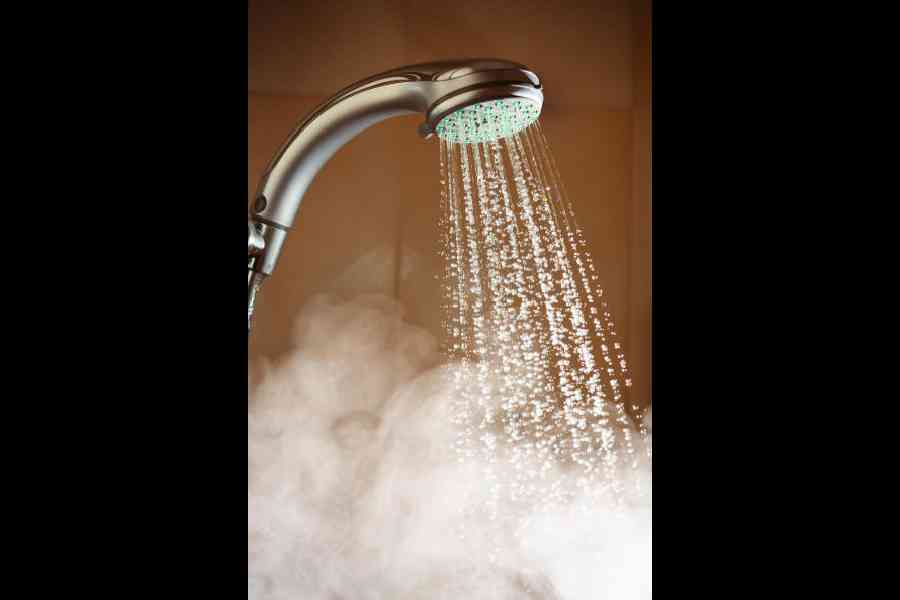It’s no secret that a hot shower can be relaxing. It can soothe sore muscles and joints, improve your mood and help you sleep better.
“There are benefits to warmer showers or baths, so I don’t want to discount that,” said Dr Victoria Barbosa, an associate professor of dermatology at the University of Chicago in the US. But, she added, “none of those benefits is for your skin.”
The research on how hot water affects our skin and hair is thin, dermatologists said,
but most experts agree that scorching showers may strip away oils and moisture-retaining substances. Generally, it’s best to take lukewarm showers, experts said.
“A hot bath or shower should be a treat, not a daily occurrence,” Dr Barbosa said.
Impact on skin
When it comes to the effects of bathing on skin health, research largely focuses on the use of cleansers. There aren’t many studies exploring water temperature, said Dr Blair Jenkins, a clinical assistant professor of dermatology at Michigan Medicine in the US. But dermatologists said hot water, especially when combined with soaps that contain fragrances and harsh ingredients, may damage the outermost layer, known as the skin barrier.
The skin barrier is made of dead skin cells, said Dr Paola Baker, a dermatologist in
Boston in the US, who has researched its function. Surrounding those cells is a dense matrix of fatty substances such as ceramides, fatty acids and cholesterol, she said. These substances, called lipids, help retain moisture in the skin and protect it from environmental irritants and allergens.
On top of the skin barrier is a thin layer called the acid mantle, which is made of amino acids. These acids are found in sweat and sebum — an oily substance that retains moisture and is released from glands near the hair follicles. This layer helps keep
the skin barrier strong and protects it from harmful bacteria, Dr Baker added.
When you take a scalding shower, some sebum may be removed, resulting in dry skin, experts said. The tightly packed lipids in the skin barrier may also “lose their organised structure”, which could make the skin barrier more permeable and allow water to more easily escape, said Dr Trinidad Montero-Vílchez, a dermatologist at Virgen de las Nieves University Hospital in Granada, Spain, and an author of a study published in 2022 that explored how hot water affects the skin.
The study found that when adults submerged their hands in hot and cold water, hot water did more damage. It caused skin to lose more water, weakened the skin barrier and led to redness. It also increased the skin’s pH level, which has been shown to disrupt the skin barrier and increase water loss.
Hot water might also leave the skin feeling tight and looking dull or ashy, Dr Barbosa added.
Impact on hair
Much like its effect on skin, hot water may make hair dry by stripping away sebum. But research exploring this question is limited, dermatologists said.
Although glands releasing sebum are found almost everywhere on our skin, we have a lot of them on the face and scalp, said Dr Elika Hoss, an assistant professor of dermatology at the Mayo Clinic in Arizona,US.
After a gland on the scalp releases sebum, the oily substance coats the outermost layer of hair strands. Rinsing hair with hot water may remove some sebum, Dr Hoss said, getting rid of “what’s keeping our hair moisturised and protected”.
When her patients tell Dr Jenkins that their hair feels dry and brittle, she will often ask, “What’s your shower routine?” she said. “Because we can probably make some tweaks that might be helpful.”
What’s the best way to keep skin and hair healthy?
If you don’t have dry hair or skin, or a condition like eczema or psoriasis that hot water may worsen, you most likely can enjoy a hot shower perhaps once or twice a week, dermatologists said. If you have oily skin or hair, you may be able to enjoy them more often, Dr Jenkins added.
But when you can, aim to take lukewarm showers. And keep them short, said Dr Brittany Craiglow, an adjunct associate professor of dermatology at the Yale School of Medicine, US. Ideally, showers should last five to 10 minutes, experts said.
Be sure to use gentle, fragrance-free cleansers, too. Some cleansers and shampoos contain detergents like sodium lauryl sulfate and may weaken the skin barrier, Dr Craiglow added.
And instead of washing your hair daily, consider shampooing only when necessary, such as after exercising or using a lot of products, or when your hair generally feels oily, experts said.
Also remember to moisturise your skin while it’s still damp after bathing, Dr Barbosa said. Opt for ointments or creams, which often do a better job of moisturising than lotions, she added, and look for hydrating ingredients on the label such as ceramides, glycerin or petroleum jelly.
Ultimately, people “exist on a spectrum”, Jenkins said, “and some people can certainly tolerate hot showers and not have any issues.”
NYTNS










